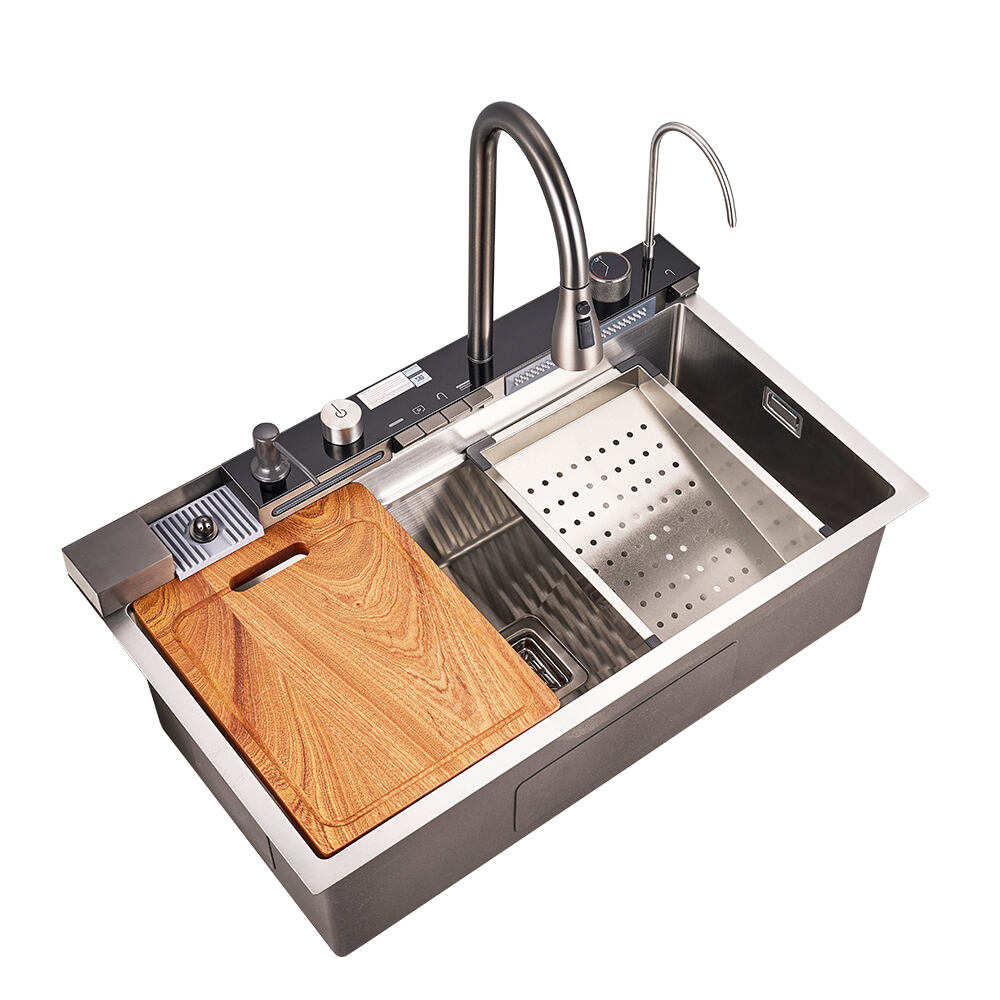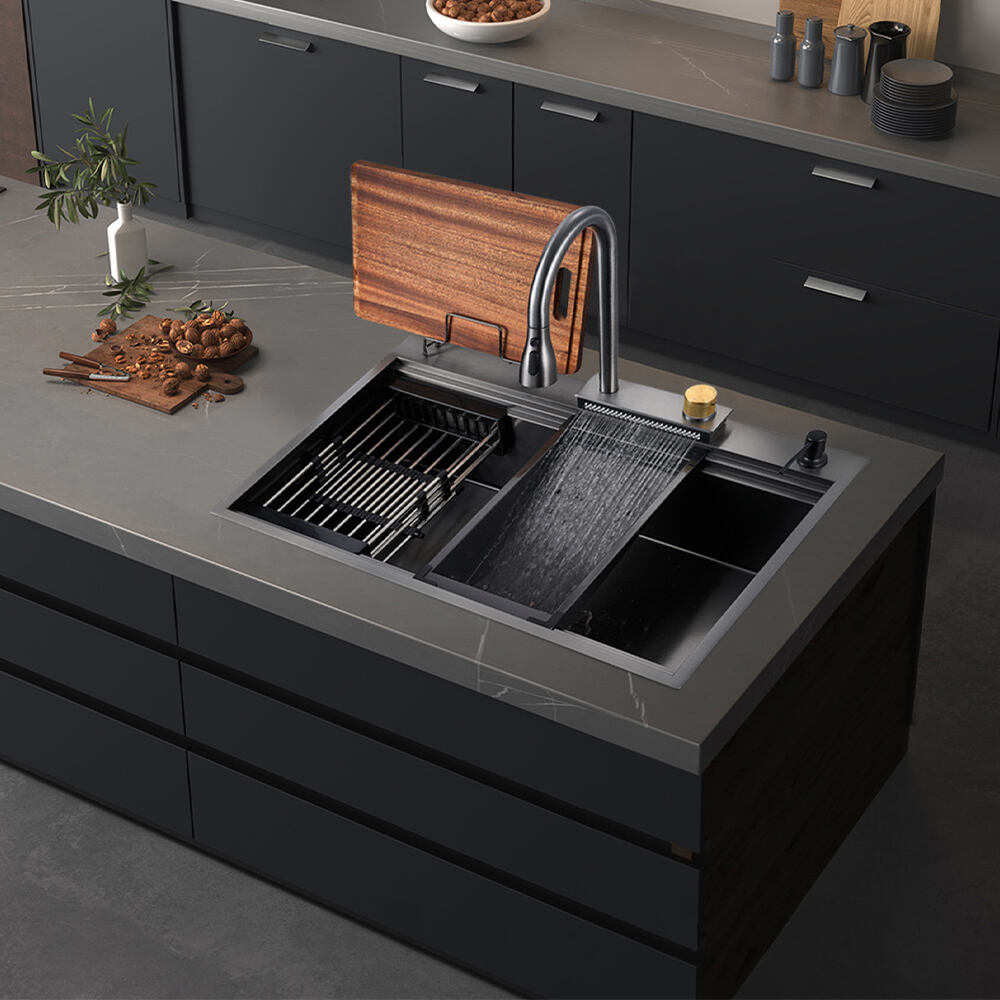Revolutionary Advancements in Modern Kitchen Sink Technology
The kitchen sink, once a simple water basin, has undergone a remarkable transformation in recent years. Smart kitchen sinks now represent the perfect fusion of functionality and cutting-edge technology, revolutionizing how we interact with this essential kitchen fixture. These innovative solutions are reshaping our daily kitchen routines, offering unprecedented levels of convenience, hygiene, and efficiency.
As homeowners increasingly embrace smart home technology, the demand for intelligent kitchen solutions continues to surge. Smart kitchen sinks have emerged as a cornerstone of modern kitchen design, incorporating features that would have seemed like science fiction just a decade ago. From touchless operation to water conservation capabilities, these advanced systems are setting new standards for kitchen functionality.
Core Features of Contemporary Smart Kitchen Sinks
Touchless Operation and Gesture Control
Modern smart kitchen sinks feature sophisticated sensor technology that enables hands-free operation. Motion sensors detect hand movements to activate water flow, allowing users to wash dishes or fill containers without physical contact. This touchless functionality not only enhances convenience but also promotes better hygiene by reducing the spread of bacteria and germs.
Advanced gesture control systems take this technology further, allowing users to adjust water temperature and flow rate with simple hand movements. Some models even incorporate voice control capabilities, enabling users to specify exact water quantities or activate specific functions through voice commands.
Intelligent Water Management Systems
Smart kitchen sinks now come equipped with sophisticated water management features. These systems monitor water usage in real-time, providing detailed feedback on consumption patterns and helping households reduce water waste. Built-in flow meters can detect leaks and alert homeowners to potential problems before they become serious issues.
Temperature control has also become more precise, with digital displays showing exact water temperature and allowing users to preset their preferred settings. Some models even include instant hot water dispensers, eliminating the need for separate kettles or water heaters.

Enhanced Functionality and Design Elements
Multi-Zone Workspace Organization
Contemporary smart kitchen sinks incorporate innovative design elements that maximize functionality. Multi-zone configurations feature separate areas for food preparation, cleaning, and waste disposal. These zones often include integrated cutting boards, drying racks, and colanders that slide along tracks or nest within the sink structure.
Advanced models feature adjustable depth zones, allowing users to customize the sink's configuration based on their current needs. This flexibility transforms the sink into a versatile workstation that adapts to various kitchen tasks, from food preparation to cleanup.
Smart Material Technology
The latest smart kitchen sinks utilize advanced materials that enhance durability and maintenance. Nano-coating technologies create surfaces that resist scratches, stains, and bacterial growth. Some models incorporate self-cleaning features, using UV light or specialized cleaning cycles to maintain hygiene without manual intervention.
These materials often include antimicrobial properties that actively inhibit the growth of harmful bacteria. Combined with smooth, seamless designs, these features make modern smart kitchen sinks more hygienic and easier to maintain than ever before.
Integration with Smart Home Ecosystems
Connected Kitchen Experience
Smart kitchen sinks now seamlessly integrate with broader home automation systems. Mobile apps allow users to monitor water usage, adjust settings, and receive maintenance alerts remotely. These connected features enable better resource management and provide valuable insights into household consumption patterns.
Integration with virtual assistants enables voice-controlled operation and coordination with other smart kitchen appliances. Users can create automated routines that optimize water temperature and flow based on specific tasks or time of day.
Data Analytics and Automation
Advanced analytics capabilities in smart kitchen sinks help homeowners optimize their water usage and kitchen workflow. Machine learning algorithms analyze usage patterns to suggest more efficient practices and automate routine tasks. These systems can even predict maintenance needs and schedule service appointments automatically.
Real-time monitoring provides insights into water quality, temperature consistency, and usage patterns. This data helps households reduce waste and identify opportunities for greater efficiency in their kitchen operations.
Sustainability and Environmental Impact
Water Conservation Technologies
Modern smart kitchen sinks incorporate numerous features designed to minimize water waste. Precise flow control and automatic shutoff functions prevent unnecessary water usage, while built-in aerators maintain strong water pressure while reducing consumption. Some models include greywater recycling systems that repurpose water for appropriate secondary uses.
Smart water meters provide detailed consumption data, helping users understand and optimize their usage patterns. Many systems also include eco-modes that automatically adjust flow rates and temperatures to maximize efficiency without compromising performance.
Energy Efficiency Features
Energy conservation is another key focus of smart kitchen sink design. Instant hot water systems eliminate the need for energy-intensive water heating, while intelligent temperature control prevents waste from excessive hot water use. LED indicators provide visual feedback on water temperature and flow, helping users make more energy-conscious decisions.
Solar-powered options and energy recovery systems further reduce the environmental impact of these advanced kitchen fixtures. These innovations demonstrate how smart kitchen sinks can contribute to more sustainable household operations.
Frequently Asked Questions
How do touchless smart kitchen sinks work?
Smart kitchen sinks use infrared sensors to detect hand movements within a specified range. When movement is detected, the system activates water flow automatically. Advanced models may include multiple sensors for different functions, such as temperature adjustment and flow control, all operating without physical contact.
What maintenance do smart kitchen sinks require?
Most smart kitchen sinks need minimal maintenance beyond regular cleaning. The electronic components are typically sealed and weather-resistant. However, sensors may need occasional wiping to ensure optimal performance, and software updates may be required periodically to maintain functionality and security.
Are smart kitchen sinks worth the investment?
Smart kitchen sinks often provide significant value through water savings, improved hygiene, and enhanced functionality. While the initial cost may be higher than traditional sinks, the long-term benefits in terms of resource conservation, convenience, and reduced maintenance often justify the investment for many households.



